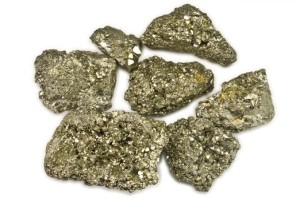We all know what gold is, but how about “fool’s gold”? What is it and how is it different from real gold? Let’s find out.
What Is Fool’s Gold?
Fool’s gold is another name for the mineral pyrite, which has a yellow color and a metallic luster.

Pyrite (fool’s gold) stones
Pyrite is referred to as fool’s gold because many people have mistaken it for real gold, fooled by pyrite’s resemblance to the precious metal.
How Fool’s Gold Is Different from Real Gold
Although pyrite and gold look very similar, they are very different in terms of structure.
Unlike real gold, fool’s gold is not a metal. It is a mineral, an iron sulfide, and has a crystalline structure.
Some pyrite can actually contain traces of metal, such as gold.
Ways to Tell the Difference Between Fool’s Gold and Real Gold
The best way to tell pyrite from real gold is to look at its shape, and examine its structure and physical properties.
Here are the more reliable ways to spot fool’s gold:
Shape
Fool’s gold is made up of crystals and has sharp edges, while real gold is a metal with a smoother texture and rounder edges.
If you look closely at the piece and see that its structure consists of what looks like small and sharp cubes, then it is fool’s gold.

Pay attention to the structure of fool’s gold – pyrite crystals have sharp edges.
Smell Test
Pyrite smells of sulfur. Gold, on the other hand, doesn’t give off such an odor.
So, if you sense any hint of sulfur when you smell the material, then it is likely fool’s gold.
Malleability
Real gold is soft and malleable. So when pressure is applied to it, gold flattens.
Pyrite, on the other hand, is brittle. It shatters easily when hit.
You can test whether a piece is fool’s gold by sticking a pin in it. Gold should just be dented, whereas pyrite should crumble at the spot where the pin is being stuck.
Rub Test
If you rub real gold against white porcelain, the metal will leave a yellow mark.
Fool’s gold, in contrast, will leave a mark that is dark green or black.
Scratch Test with Copper
Copper is harder than gold and softer than pyrite.
Therefore, if you try to scratch a piece of copper with fool’s gold, it will leave a mark on the copper.
Real gold cannot scratch copper but can be scratched by it.
Shine Test
Pyrite glitters when exposed to light. When it is darker, however, fool’s gold will not have any shine.
Real gold has a much softer shine and will have luster even when not exposed to direct light.
